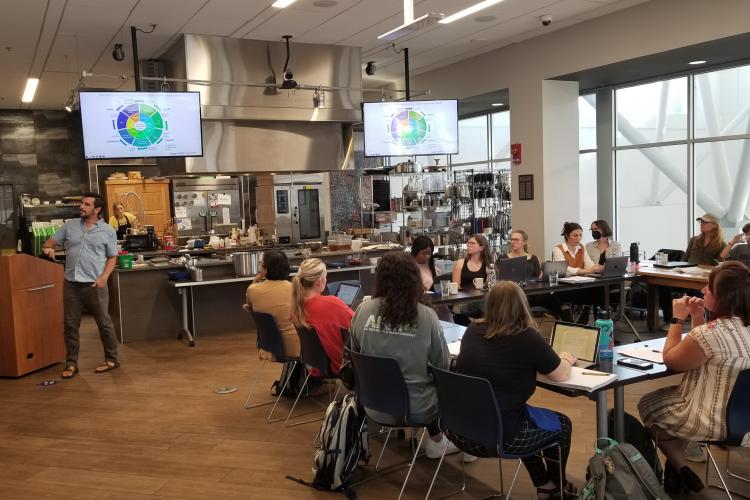New UK course offers outlooks on food systems
New UK course offers outlooks on food systems


In a new course this fall, University of Kentucky graduate students from a variety of majors are learning about sustainable food systems.
UK College of Agriculture, Food and Environment faculty offer "Interdisciplinary Perspectives on Sustainable Food Systems,” to introduce students to the basics of systems thinking from multiple disciplines, as well as the many different ways people view food systems. Students also get the chance to meet and learn from a wide range of Kentucky’s agriculture and food sector professionals. In this course, graduate students learn how to apply the multidisciplinary principles of the agri-food system while maintaining the distinctive perspectives of their own disciplines.
“I took this class because I wanted to see more of a grounding in food systems, but also to see how these topics are being discussed from such a wide variety of disciplines,” said Christian Keeve, a geography Ph.D. student. “I think the class is a really good mix of practical, theoretical and conceptual knowledge. It also allows critiques from many different angles, which I think is very useful.”
Before the semester began, students spent a week traveling across the state, visiting farms and meeting the people who work in them. They spent each day in a different region of the state, stopping at farms, food businesses and nonprofits. On the last day, participants toured UK’s Campus Kitchen to learn about hunger and food access initiatives at the university and to explore UK’s local food systems institute, The Food Connection.
“I just think it is fascinating,” said Pam Holbrook, a student in the class, farmer and Anderson County farmers’ market produce vendor. “It’s kind of like a Kentucky travel wishlist being able to hit Marksbury Farm, App Harvest and all of those places as well as sit and discuss it with a really diverse group of students.”
This course prepares graduates to explain how their graduate field contributes to solving complex food system problems; identify and analyze a problem within a local or regional food system using interdisciplinary principles; develop a participatory, stakeholder-driven solution to the problem and to present a formal persuasive presentation that relates underlying theory to the problem.
“This course is meant to provide a lot of opportunities for grad students to develop connections across the different disciplines, but it also has benefits for faculty,” said Nicole Breazeale, associate professor in the UK Department of Community and Leadership Development. “I am hopeful that there will also be an opportunity for additional research and outreach work for us as faculty.”
Each week, the students have class at The Food Connection where they prepare a meal and then discuss food systems. Krista Jacobson, associate professor in the UK Department of Horticulture and The Food Connection’s faculty chair, said the class is traditional but leverages The Food Connection to help students see things through the local food systems lens.
“We will have a lot of academic reading and discussion, but each class students will take turns cooking a meal together with an emphasis on local food,” she said.
Community & Leadership Development Family & Consumer Sciences Dietetics & Human Nutrition

